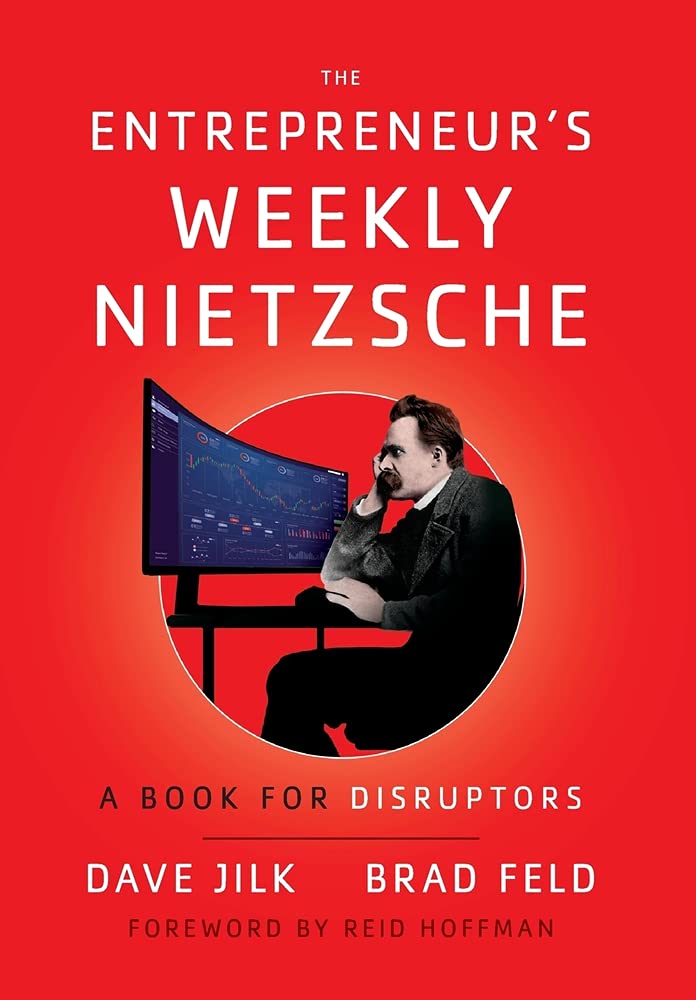Summaries of Silent Killers, Culture, and Information from the Entrepreneur’s Weekly Nietzsche by Dave Jilk and Brad Feld
Silent Killers, Information, and Culture
Silent Killers, Information, and Culture are three chapters in Entrepreneur’s Weekly Nietzsche by Dave Jilk and Brad Feld. The book is intended for entrepreneurs and draws from the authors experience as entrepreneurs and venture capitalists. They also offer a number of short narratives by other entrepreneurs. The book has 52 chapters so that you can read one a week. It’s a box of chocolates, where some pieces are of high quality and others less so. They open each chapter with a quote from Nietzsche, but even though I collect quotes for entrepreneurs I did not find any in this book worth curating.
I have picked out the three best chapters and boiled them down to their essentials below.
Visibility can be helpful at the right times, places, and quantities. But what priority should you assign to creating buzz?
The risk is that you borrow enthusiasm against the future value you intend to deliver. But you eventually need to provide that value to customers. Energy and focus directed toward creating buzz can distract you from building products and understanding what customers need. Worse, the excitement and attention can be addictive. You may find it tempting to invest more in buzz even when it’s taking longer than you anticipated to create a product that solves customer problems.
These delays mean that the reality of what you can ship lags further behind what you are promising, leading inevitably to customer disappointment and dissatisfaction you find difficult to recover from.
Silent killers talk to customers, not the press. They energize their engineers, not journalists. They let satisfied customers spread the word.
Summary of Information
A stable business subordinates learning to execution because it has, for the moment, the answers it needs. Entrepreneurship is different; it must rely on innovation that requires exploration and experimentation. A search or experiment may fail, but entrepreneurs understand that failure is unavoidable in any effort involving learning and self-improvement.
The tension between discovery and results operates in every field that involves creativity and invention. It’s critical to minimize the losses from failures in a way that preserves your ability to learn and progress: you never assume any one effort will succeed and instead plan for many small failures with a few more significant wins to prosper.
Summary of Culture
You need to manage the possibility that others may violate your trust. Begin with trust but limit the risk or loss that such trust may entail. Your regret should not be that you trusted them but that you can no longer trust them.
Being more open to positive relationships makes you more likely to find them. You may be taken advantage of more often but in limited ways, encouraging you to assess people accurately as you work with them.
You can start quickly with a handshake or plain English agreements that may involve small losses but avoid larger ones. This is often more effective than more slowly with attorneys drafting elaborate contracts.
Think through and experiment with how you manage trust: how you offer and earn it.
Related Blog Posts
- Book Club: Traversing the Traction Gap by Bruce Cleveland
- M. C. A. Hogarth on Business for the Right-Brained
- Andrew Grove on Recognizing Reality
- Eliza Calvert Hall: Piecing a Quilt is Like Living a Life
- Innovation Principles from Ken Iverson’s “Plain Talk”
- “Weinberg on Writing” Fieldstone Method Useful For Entrepreneurs
- Seth Godin’s “Bootstrapper’s Manifesto”
- Amar Bhide: Start With Affordable Bets in Markets Too Small to Interest Large Players
- Anything You Want By Derek Sivers

